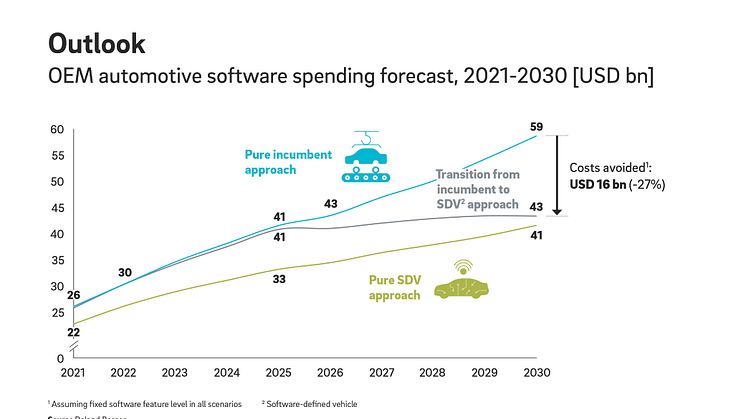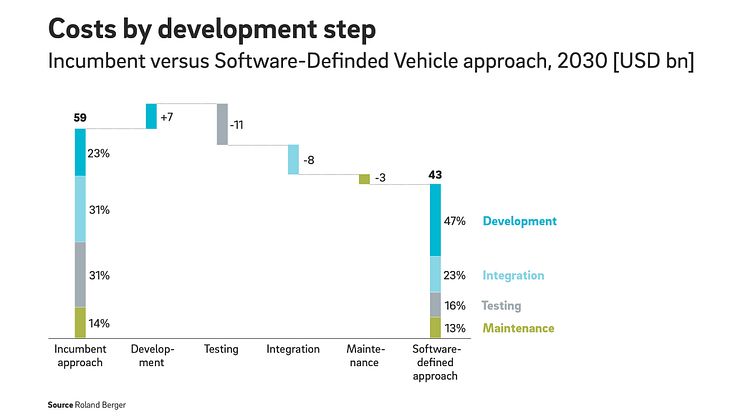
Press release -
Automotive industry: Software spending set to rise to as much as USD 59 billion per year by 2030
- Annual software costs could more than double by 2030 with existing vehicle concepts
- New software-based design approach will allow to avoid costs of nearly USD 16 billion per year starting in 2030
- Software distribution can open up additional sources of revenue
Munich, July 2022: As electrification, connectivity and automated driving functionality increase, the automotive industry will need to invest ever greater sums in software. By 2030, spending could rise from USD 26 billion in 2021 to USD 59 billion. The way to tackle this is with new design concepts in which the vehicle is built around a software platform from the outset. Starting in 2030, this can help avoid almost USD 16 billion of cost per year. These are some of the key findings of the latest publication in the Roland Berger study series "Computer on Wheels (4): The future of the automotive software industry: Spend, trends and how to transform."
"The automotive industry can only afford the software it will need in the future if it cuts costs elsewhere," says Falk Meissner, Partner at Roland Berger. "Key to this is to move away from the current design approach where software and technical functions are integrated in an existing vehicle concept and to transition to a new, software-defined vehicle. The car of the future is a computer on wheels – and that must be reflected in the very first steps of vehicle design."
Making this switch is of existential importance for the industry. The study authors put the growth rate for software costs at 6% per year. This will more than double today's spend to USD 59 billion by 2030. With the software-defined vehicle (SDV) concept, by contrast, costs will increase by just 70% to USD 43 billion.
Looking at the costs for each step in the development cycle, it is clear that SDV necessitates the design of more complex software architectures, which will lead to higher R&D spending of around USD 7 billion. However, this increase is more than offset by the significantly lower costs of more agile software production: USD 11 billion can be saved in testing, USD 8 billion in integration and USD 3 billion in software maintenance. This will also free up resources for the development of new software content.
Software patents will become a competitive factor
Building software-defined vehicles offers many advantages; ideally, however, the transition to this new design concept will require industry-wide cooperation. OEMs and suppliers will have to rethink their software value chain and business model. The industry will first need to agree on common standards for vehicle architectures and the use of open-source software. Companies that offer proven software content as a product will be able to recycle software, achieve economies of scale and refinance investments.
"Reselling intellectual property is already part of the core business for suppliers and specialized software providers, but it is still largely uncharted territory for vehicle manufacturers," so Meissner. "To exploit the commercial potential of marketing intellectual property, automotive companies will need to partner with suppliers to an increasing extent and take advantage of emerging software marketplaces."
Topics
Categories
Roland Berger is the only strategy consultancy of European origin with a strong international presence. As an independent firm owned exclusively by our partners, we have 51 offices with a presence in all major markets. Our 2,700 employees are characterized by a unique combination of analytical thinking and an empathetic mindset. Driven by our values of entrepreneurial spirit, excellence, and empathy, we are convinced that business and society need a new, sustainable paradigm that focuses on the whole value-creation cycle. By working in interdisciplinary teams across all relevant sectors and business functions, Roland Berger offers the best expertise worldwide for successfully overcoming the profound challenges of our age now and in the future.





